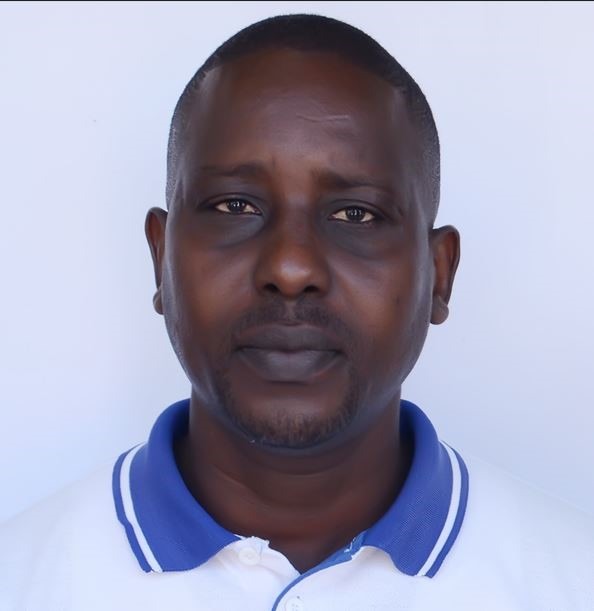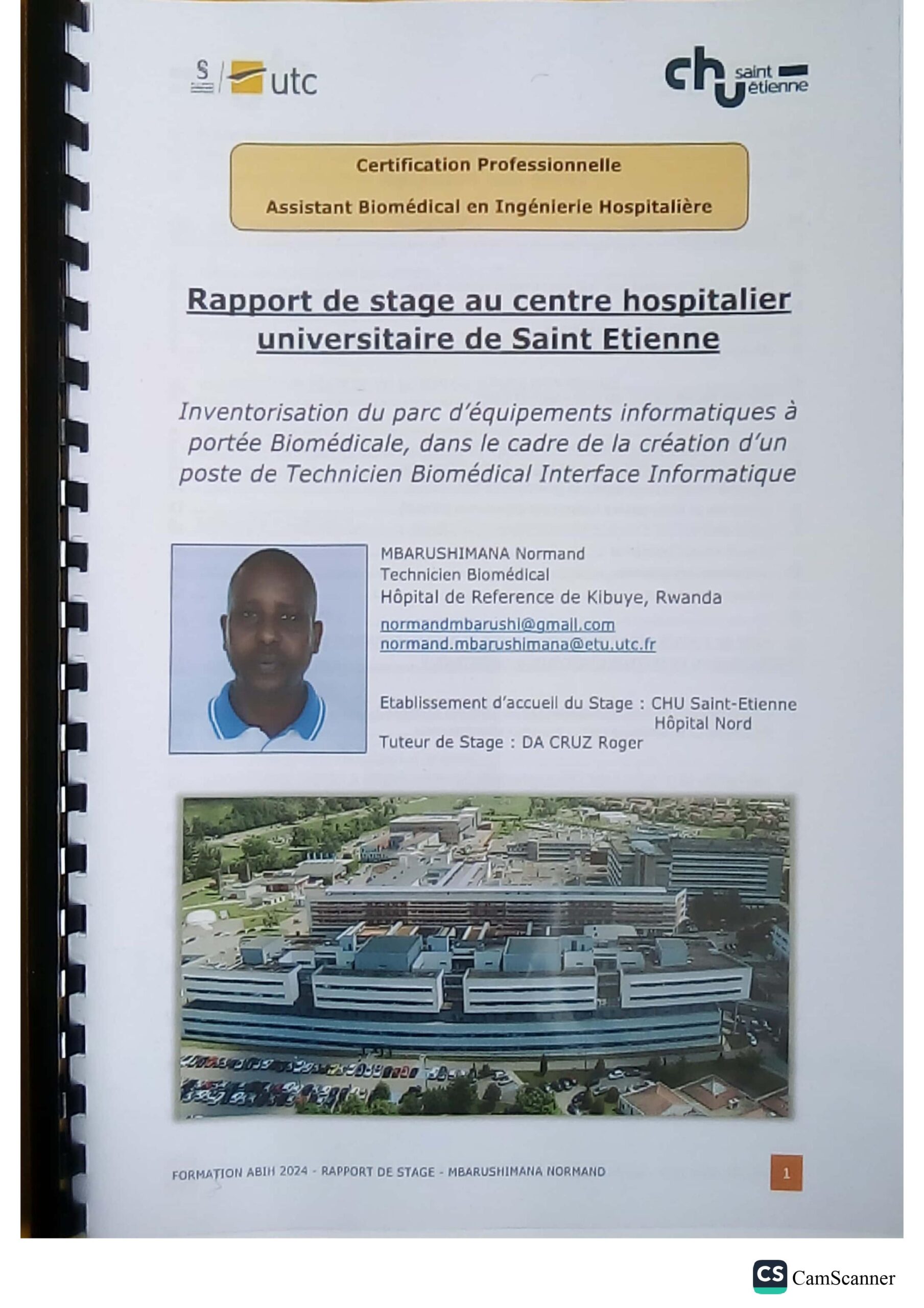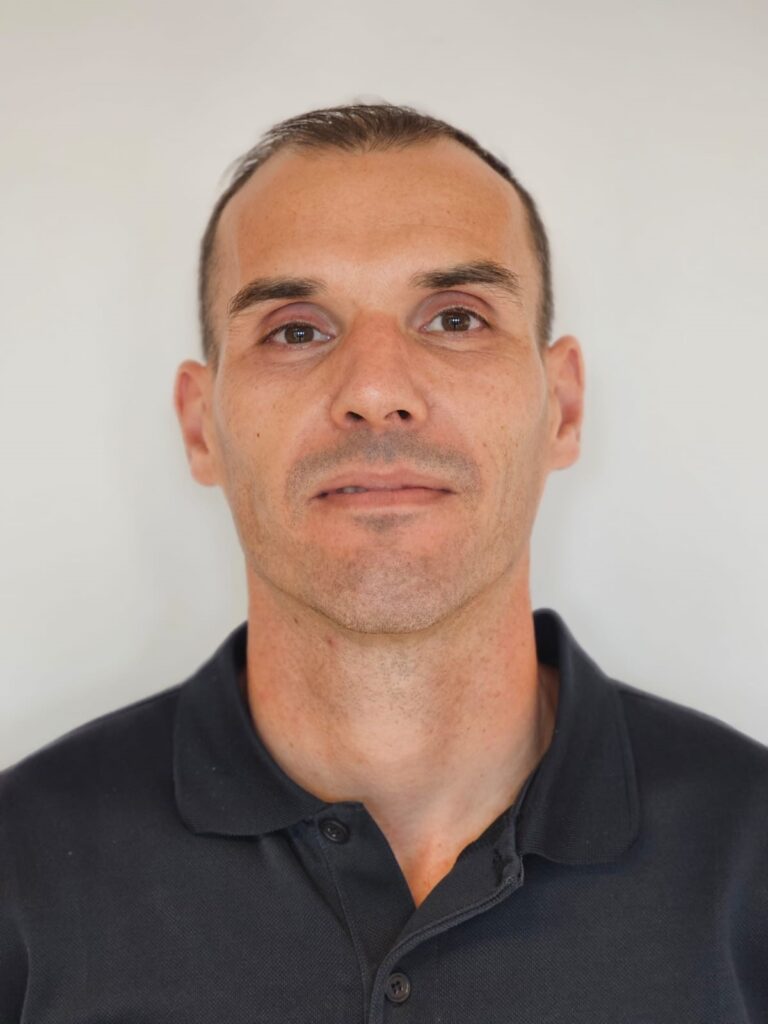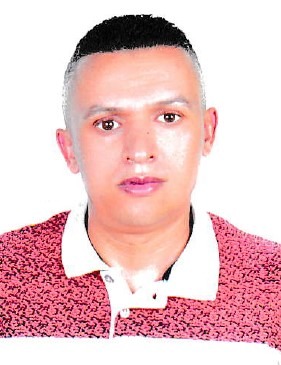ABIH-2411-SIMONET-Remise à plat de la procédure de mise en service des équipements biomédicaux : de l’acquisition à la réforme au RHNe
Simonet

Contact
Simonet Jonathan : Jonathan.simonet@rhne.ch
Citation
A rappeler pour pour usage : JS.SIMONET«Remise à plat de la procédure de mise en service des équipements biomédicaux : de l’acquisition à la réforme au RHNe», Université de Technologie de Compiègne (France), Assistant Biomédical en Ingénierie Hospitalière, Mémoire de Stage, réf n° abih-2411, 2024, https://abih.utc.fr/ptojets/abih-2411
Résumé
Le service d’ingénierie biomédicale du Réseau hospitalier neuchâtelois (RHNe) joue un rôle essentiel dans la garantie d’une bonne qualité de soins aux patients en se concentrant sur les dispositifs médicaux. Leur activité comprend la gestion de la politique d’investissement et d’exploitation, la supervision de la maintenance corrective en lien avec les prescriptions de la matériovigilance.
La maitrise du parc leur est nécessaire et elle passe par la mise en inventaire correcte, des équipements lors de la livraison mise en service pour une sécurité plus accrues de l’activité de soins. Dans le cadre de mon projet de stage de validation de mon diplôme d’assistant d’ingénieur, j’ai eu l’opportunité d’effectuer mon stage au sein du service d’ingénierie biomédicale de mon institution et de pouvoir apprécier l’autre versant de la prise en charge des dispositifs médicaux. Ce stage m’a permis de mettre en pratique les différentes étapes du processus de mise en service des équipements biomédicaux et de comprendre les indicateurs de gestion de parc, d’anticiper les risques pour les patients en cas de lacunes dans le suivi.
Au cours de cette expérience, j’ai compris la nécessité de faire preuve de rigueur à tous les niveaux du processus afin de limiter les couts, les risques et garantir une prise en charge sécuritaire des patients qui sont le cœur de nos missions quotidiennes.
Abstract
The Biomedical Engineering Department of the Réseau hospitalier neuchâtelois (RHNe) plays an essential role in ensuring high quality patient care by focusing on medical devices. Their activities include managing investment and operating policies, and overseeing corrective maintenance in line with materiovigilance requirements.
They also need to ensure that their equipment is correctly inventoried at the time of delivery and commissioning, in order to enhance the safety of care activities. As part of my internship project to validate my engineering assistant diploma, I had the opportunity to carry out my internship in the biomedical engineering department of my institution, and to appreciate the other side of medical device management. This internship enabled me to put into practice the different stages of the biomedical equipment commissioning process, and to understand asset management indicators and anticipate risks to patients in the event of gaps in monitoring.
During this experience, I came to understand the need for rigor at all levels of the process, in order to limit costs and risks, and guarantee the safe care of patients who are at the heart of our daily missions.
Téléchargement
Auteur

Contact
MBARUSHIMANA Normand: normandmbarushi@gmail.com
Citation
A rappeler pour tout usage : MBARUSHIMANA NORMAND, « Inventorisation du parc d’équipements informatiques à portée Biomédicale, dans le cadre de la création d’un poste de Technicien Biomédical Interface Informatique », Université de Technologie de Compiègne (France), Assistant Biomédical en Ingénierie Hospitalière, Mémoire de Stage, réf n° abih-24–05, 2024, https://abih.utc.fr/projets/abih-24–05/
Résumé
L’objet de ce projet vise à démontrer l’importance de l’inventaire du parc d’équipements informatiques biomédicaux et à définir les rôles, les compétences et le profil requis pour l’intégration d’un technicien biomédical interface informatique.
L’objectif est de créer un poste dédié au sein du service de maintenance biomédicale, permettant d’optimiser la gestion des DM, d’améliorer la sécurité des patients et d’accroître la qualité des soins délivrés.
Mots clés : Equipement Informatique biomédicale, Inventaire, Réseaux informatiques biomédicaux, Technicien Biomédical Interface Informatique.
Abstract
The purpose of this project aims to demonstrate the importance of the inventory of biomedical IT equipment and to define the roles, skills and profile required for the integration of a biomedical IT interface technician.
The objective is to create a dedicated position within the biomedical maintenance department, making it possible to optimize the management of medical devices, improve patient safety and increase the quality of care delivered. Keywords: Biomedical IT equipment, Inventory, Biomedical IT networks, IT Biomedical Technician.
Téléchargement

SIMONET-MBARUSHIMANA-RWIBASIRA


Normand

Contact
Simonet Jonathan : Jonathan.simonet@rhne.ch
Mbarushimana Normand : normandmbarushi@gmail.com
Rwibasira.M.Jean de Dieu: rwijean@gmail.com
Citation
A rappeler pour pour usage : JS.SIMONET NM. Mbarushimana JR. Rwibasira.M«TEST-ABIH-2403–Amélioration de la gestion des contrats de maintenance des dispositifs médicaux au Rwanda», Université de Technologie de Compiègne (France), Assistant Biomédical en Ingénierie Hospitalière, Mémoire de Stage, réf n° abih-2403, 2024, https://abih.utc.fr/ptojets/abih-2411
Résumé
Ce projet vise à faire une approche autour de la gestion des contrats de maintenance dans les établissements de santé au Rwanda.
Actuellement, la gestion des contrats de maintenance des dispositifs médicaux au Rwanda est souvent fragmenté et inefficace. Cela peut entraîner des pannes d’équipement, des retards dans les réparations et des risques pour la sécurité des patients
Face à une réglementation de plus en plus stricte et des technologies plus complexes ; les contrats de maintenances sont gérés par le ministère de la santé au Rwanda et l’appel à des prestataires de maintenance externe est devenue utile pour subvenir aux besoins des établissements de santé et répondre aux enjeux fixés par la politique de maintenance.
Nous avons fait une enquête auprès des techniciens et responsables Biomédicaux basés sur les différents établissements de santé au Rwanda pour Collecter des informations et des avis sur le processus et les démarches des contrats de maintenance des dispositifs médicaux au Rwanda. Pour objectif de monter un groupe de travail avec les techniciens et responsables biomédicaux et d’impliquer le RBC sur les difficultés des établissements de santé autour de la gestion des contrats de maintenance.
Qui a pour but une amélioration continue de la gestion des contrats de maintenance et à l’avenir envisagé des meilleures connaissances au sein des établissements de santé au Rwanda, tout en favorisant le savoir-faire interne qui n’est pas encore bien développé au Rwanda.
Abstract
This project aims to develop an approach around the management of maintenance contracts in health establishments in Rwanda.
Currently, the management of medical device maintenance contracts in Rwanda is often fragmented and inefficient. This can lead to equipment failures, delays in repairs and patient safety risks.
Faced with increasingly strict regulations and more complex technologies; maintenance contracts are managed by the Ministry of Health in Rwanda and the call on external maintenance providers has become useful to meet the needs of health establishments and respond to the challenges set by the maintenance policy.
We conducted a survey among Biomedical technicians and managers based in different health establishments in Rwanda to collect information and opinions on the process and procedures for medical device maintenance contracts in Rwanda. The objective is to set up a working group with biomedical technicians and managers and to involve the RBC on the difficulties of health establishments around the management of maintenance contracts.
Which aims to continuously improve the management of maintenance contracts and in the future envisaged better knowledge within health establishments in Rwanda, while promoting internal know-how which is not yet well developed in Rwanda.
COLLET-SAMSON-TOUATI



Contact
COLLET Anthony: colletanthony@hotmail.com SAMSON Jean-Philippe: jp.samson@ch-ajaccio.fr TOUATI Atef: touatiatef73@gmail.com
Citation
A rappeler pour tout usage: Anthony COLLET Jean-Philippe SAMSON Atef TOUATI “Créer un outil de calcul d’un temps prévisionnel en équivalent temps plein pour la maintenance curative”, Université de Technologie de Compiègne (France), Assistant Biomédical en Ingénierie Hospitalière, réf n°abih-2401,2024, https://abih.utc.fr/projets/abih-2401/
Résumé
Un outil de calcul d’équivalent temps plein permet d’évaluer la charge de travail d’un service biomédical en prenant en compte différents facteurs : le nombre de dispositifs médicaux, le type de maintenance, la taille du centre hospitalier…
La création de cet outil génère automatiquement le temps global passé par les techniciens biomédicaux sur la maintenance curative. Ces chiffres illustreront également les étapes de cette maintenance et permettront d’élaborer des procédures bien définies pour remédier aux étapes consommatrices de temps.
Il sera donc l’outil indispensable à l’ingénieur biomédical pour organiser la maintenance de son service et justifier la charge de travail auprès de sa hiérarchie.
Abstract
A full-time equivalent calculation tool can assess the workload of a biomedical department by taking into account various factors: the number of medical devices, the type of maintenance, the size of the hospital centre, etc.
The creation of this tool automatically generates the overall time spent by biomedical technicians on curative maintenance. These figures will also illustrate the stages of this maintenance and will make it possible to develop well-defined procedures to remedy the time consuming stages.
It will therefore be the essential tool for the biomedical engineer to organize the maintenance of his service and justify the workload to his hierarchy.